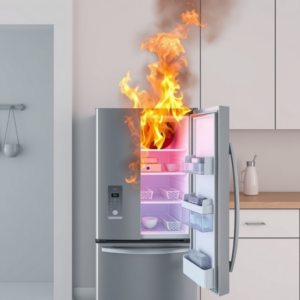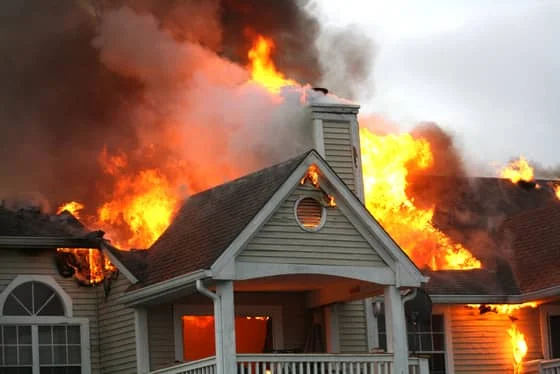Can Your Refrigerator Really Start a House Fire?
Prioritizing home fire safety is crucial for every household. However, most of the homeowners tend to disregard one particular threat that is often found in their kitchens—the refrigerator. It is possible that you will have some questions concerning if can a refrigerator catch on fire. Strangely enough, this is an affirmative. This blog post will explore the mechanisms that can lead to such fires, how you can recognize warning signs, and what measures you can take to prevent them. By understanding the risks and taking proactive steps, you can keep your home and loved ones safe from appliance-related fires.
Understanding the Mechanism of a Refrigerator Fire
In order to comprehend the reasons behind certain incidents of a refrigerator catch on fire, it is critical to examine how these appliances function. More specifically, a refrigerator is not only a simple box relying on ice packs for cooling but actually a system of devices with electrical parts and thermodynamic cycles, which control the temperature to ensure your food remains cool. The compressor, condenser, and evaporator coils work in harmony to circulate refrigerant, which absorbs and releases heat to maintain a cool interior temperature.
However, several factors can disrupt this system and potentially lead to a fire. Since refrigerators work continuously, electrical faults are among the greatest concerns. Worn out wiring or overloading of the circuit may also give rise to sparks or excessive heat causing burning of combustibles present either inside or externally to the appliance. Additionally, component failures such as malfunctioning compressors or fan motors can generate excessive heat, increasing the risk of fire.
Equally important are the building components. A considerable number of fridges have plastics, insulating foam and other combustibles which if exposed to flame may either catch fire or propagate the flame. These devices are modified by the manufactures with the concern of safety however as time goes by and the appliances develop faults, the situation changes.
Common Causes of Refrigerator Fires
Several factors can contribute for a refrigerator catch on fire. A number of reasons can lead to such damage and one of them includes electrical faults.
 For instance, poorly done wiring, loose connections or wires that have been damaged could cause arcing, a phenomenon whereby electricity leaps across and between wires thus causing heat and sparks. Overloaded circuits or power surges can exacerbate these issues, overwhelming the electrical system and causing a fire.
For instance, poorly done wiring, loose connections or wires that have been damaged could cause arcing, a phenomenon whereby electricity leaps across and between wires thus causing heat and sparks. Overloaded circuits or power surges can exacerbate these issues, overwhelming the electrical system and causing a fire.
Component failures are another major culprit. Compressors, responsible for circulating refrigerant, can overheat if they malfunction or become obstructed. In the same manner, the failure of fan motors necessary for the cooling of machinery would also result in the accumulation of heat within the appliance itself. These mechanical malfunctions not only affect the cooling efficiency of the device, but they can also cause combustion of excessive heat to any combustible materials close by.
Environmental factors can further increase the risk of a refrigerator fire. Setting up a refrigerator in a cramped area without any airflow will lead to its overheating. Also, when dust and dirt build up on the condenser coils, they become less effective which makes the product generate a lot of heat. Regular cleaning and ensuring proper spacing around the appliance can mitigate these risks.
Signs Your Refrigerator Might Be at Risk
Recognizing warning signs early on can prevent a refrigerator fire. One significant characteristic is unusual sounds. In the event that your refrigerator begins to produce loud humming, buzzing or even clicking noises, it is likely an indication of a faulty part. Be sure to notice any smells of burning as well. These can mean that certain electrical parts are overheating, or that plastic materials are beginning to melt.
Obvious indicators like burn stains or color changes on the refrigerator’s surface or close to the electrical cable should raise concerns. Such things could mean that the system has been overheated in the past or there are current issues with it. Moreover, if you observe that the fridge is hot on the outside or is jogging warm air, it may be that the compressor or the fan is not working properly which helps in the maintenance of temperatures inside the fridge.
Observing repeated circuit breakers tripping is yet another red flag. This may imply that an electrical circuit is overloaded or that the problem lies within the appliance. In such situations, it is important to take action quickly to eliminate any risks of fire.
Preventive Measures and Maintenance Tips
Taking proactive steps can significantly reduce the chances of your refrigerator catching fire. Regular maintenance is key. To avoid any potential overheating scenario due to accumulation of dust and trash, it is advisable to clear the condenser coils at a minimum of two times every year. It is possible to do some vacuuming or even use a coil brush in order to keep the coils’ surface in good order.
Equally important is the installation process itself. Make sure that there is enough space around the refrigerator for ventilation. In order for the heat to be borne without any difficulty, a clearance of one to two inches on all the sides is advisable. Avoid placing the appliance near heat sources like stoves or direct sunlight, as these can raise its internal temperature.
Professional inspections can catch potential problems before they escalate. Schedule annual check-ups with a qualified technician to assess the electrical and mechanical components of your refrigerator. If you notice any warning signs, don’t hesitate to call a professional for repairs.
What to Do in Case of a Refrigerator Fire
If a fire starts in or around your refrigerator, knowing how to react can make all the difference. First and foremost, prioritize safety. Evacuate everyone from the premises and call emergency services immediately. Attempting to extinguish the fire yourself can be dangerous, especially if electrical components are involved.
Having a fire safety plan in place can help in such emergencies. Ensure all household members are familiar with evacuation routes and designate a meeting point outside. Equip your kitchen with a fire extinguisher specifically rated for electrical fires, and ensure everyone knows how to use it safely.
Once emergency services arrive, they will assess and manage the situation. After the fire is contained, consult a professional to evaluate the extent of the damage and determine whether the appliance can be repaired or needs replacement.
Conclusion
In conclusion, while a refrigerator catch on fire might seem unlikely, it’s a real risk that homeowners should not ignore. By understanding how these fires can occur and recognizing warning signs, you can take proactive measures to prevent them. Regular maintenance, proper installation, and professional inspections are essential steps in safeguarding your home.
All of these serve as reminders of the potential consequences of neglecting refrigerator fire risks. Developing a fire safety plan and knowing how to respond in case of an emergency are crucial for protecting your family and property.
For more information on home fire safety and tips on preventing appliance-related fires, explore our additional resources. Taking these proactive steps will help you maintain a safe and secure living environment.

